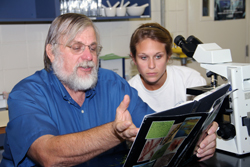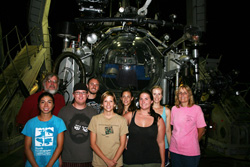Semester by the Sea

Semester By The Sea is a one-semester program for undergraduate students offered by Harbor Branch Oceanographic Institute and the Department of Biological Sciences, Florida Atlantic University. This program is designed to provide undergraduate students an opportunity to broaden their educational experience with a semester-long immersion in marine science, with emphasis on marine biology. All courses are taught on the Harbor Branch campus in Fort Pierce, Florida, and are accredited by FAU’s Department of Biological Sciences. The program takes place in the Spring semester of each year.
Click Here for Semester By The Sea Info
TO APPLY FOR SBTS, READ THROUGH THE FOLLOWING INFORMATION AND THEN COMPLETE THE ON-LINE APPLICATION FORM. THE APPLICATION SYSTEM WILL OPEN IN SEPTEMBER AND WILL CLOSE ON OCTOBER 1st. IF YOU DO NOT HAVE A GOOGLE ACCOUNT, YOU WILL NEED TO CREATE ONE IN ORDER TO COMPLETE THE FORM.
Venue

Harbor Branch is internationally known for its research in marine science, biomedical marine research, aquaculture, and ocean engineering. Harbor Branch borders Indian River Lagoon, the estuary with the highest diversity in the U.S. The proximity of the lagoon facilitates activities such as seining, sieving, snorkeling, and boat trips, that provide students exposure to a variety of local and coastal habitats, including seagrass meadows, mangrove forests, salt marshes, intertidal mudflats, sandy shores, beach communities, and nearshore reefs. Other habitats, including the Florida Everglades and the Florida Keys reef tract, are less than half a day’s drive.
Program of Study
While the program is designed for a complete semester experience, students may register for individual courses. The recommended program consists of three core courses (12 credits) and one elective course (3 or 4 credits). Ocean Discovery, an oceanographic experience for undergraduates, is also highly recommended (3 credits).
Core Courses
OCE 4006 Marine Science (3 credit lecture) - An introduction to physical, chemical, and geological oceanography. Two lectures per week.
OCB 4032, OCB 4032L Marine Biodiversity (3 credit lecture and 1 credit lab) - An overview of the diversity of marine microbes, algae, plants, and animals, with emphasis on the marine biota of Florida. Field trips to local habitats complement lecture and labs. Two lectures per week and 6 hours of lab every 2 weeks. Lecture: Monday and Thursday 9:00-10:20; Lab: alternating Wednesdays, 9:00-12:00, 1:00-4:00. (Hanisak et al.)
OCB 4633, OCB 4633L Marine Ecology (3 credit lecture and 1 credit lab) - An introduction to the ecology of marine organisms. Field trips to local habitats complement lecture and labs. Two lectures per week and 6 hours of lab every 2 weeks. Note: Rotating the two lab courses, Marine Biodiversity and Marine Ecology, on Wednesdays permits full-day field trips for each class.
Electives (SBTS students should take one or two of these elective courses)
BSC 4930 Indian River Lagoon Experience (3 credits) - Students will engage in a week-long series of field trips in the Indian River Lagoon to collect biological samples and physical-chemical data for subsequent analysis in the laboratory. Note: This course is restricted to students registered for other SBTS courses.
BSC 4930 Aquaculture and the Environment (3 credit lecture) - The basic planning and culture requirements of aquatic organisms (aquatic plants, molluscs, crustaceans, and fish), as well as culture systems, disease diagnosis, and business feasibility analysis.
BSC 4930 Molecular Ecology (3 credit lecture/lab) - An introductory course that focuses on characterizing individuals, populations and species through molecular variation (Deoxyribonucleic acid -DNA). It includes theory and laboratory sections and provides the basics for DNA analyses in any living organism. Molecular markers will be used to quantify genetic diversity, track movement of individuals, measure inbreeding and characterize new species. You will learn how to use these methods in the laboratory and through computer analyses. These molecular DNA techniques are important in a wide range of applications from conservation biology to evolutionary ecology, and are used frequently to understand which populations are endangered and at risk of inbreeding, and to solve cases in wildlife forensics, stock assessments and parentage analysis.
Prerequisites: The prerequisites for these courses as a group are two semesters each of introductory biology and general chemistry, i.e., BSC 1011, 1011L; BSC 1010, 1010L; CHM 2045, 2045L; and CHM 2046, 2046L, unless a special exception is made by faculty. Credits toward Bachelor of Science (B.S.) Degree in Biology: SBTS courses are Tier II or Tier III courses. See here for the B.S. audit checklist and, if further questions, check with advisers in the Department of Biological Sciences.
Application Procedure
In order to apply for SBTS, please complete the on-line application by clicking HERE . You will need to have:
- A one-page essay describing your experience and explaining why you want to attend SBTS. Please include your name at the top of the essay.
- An unofficial copy of your transcript to upload.
You also need to request a letter of recommendation from a faculty member which should be sent directly to Dr. Annie Page, Harbor Branch Oceanographic Institute, 5600 US #1 North, Fort Pierce, FL 34946 or by e-mail to cpagekarjian@fau.edu
Applications will be accepted until October 1st, we will announce results by the third week of October.
Housing
During Semester By The Sea, students have the option of living on the Harbor Branch campus or staying off-campus. Apartment-style housing, with full cooking facilities, is available on campus. For students who prefer to live off campus, the nearby communities have a wide variety of options.
For more information on housing options, click here or contact: HBOI_housing@fau.edu or 772-242-2400.
Library
Students enrolled in Semester By The Sea have access to the Harbor Branch Library and have full circulation privileges. The library is an open-stack research library whose collections and services are developed and maintained for the support of our researchers, students, and visiting investigators. The library includes more than 17,000 volumes, 180 current periodical subscriptions, and 20,000 cataloged reprints and technical reports, with emphasis on the biological, environmental, medical, and oceanographic sciences. The library provides photocopy equipment, workstations for the HBOI network with full Internet access, an online catalogue, and access to a variety of electronic publications.
Computer Lab
Students enrolled in Semester By The Sea have access to Marine Education’s computer laboratory. This facility, equipped with networked PCs with Internet access, and laser and inkjet printers, provides students with resources to access the Internet, enter and analyze data, write reports, and create presentations.
Semester By The Sea Faculty
Chaves-Fonnegra, Andia
(Ph.D., Nova Southeastern University)
Interests: understanding the mechanisms that underlie changes in marine and coastal ecosystems by studying the structure and dynamics of organisms, populations and communities. Her focus is on marine sponges, corals and algae.
Hanisak, M. Dennis
(Ph.D., University of Rhode Island)
Interests: marine botany, physiological ecology of marine plants (macroalgae and seagrasses), nutrient dynamics, coral reef ecology, biology of deep-water macroalgae, marine plant cultivation.
Jiang, Mingshun
(Ph.D., Ocean University of Qingdao, China)
Interests: estuarine and coastal dynamics, ocean iron and carbon cycles, water quality, ecosystem functioning, and coastal inundation. Research projects include modeling carbon cycle and pH for understanding ocean acidification in estuarine and coastal oceans, modeling water quality and harmful algal blooms in estuarine and coastal oceans, modeling iron (Fe) and carbon cycle in shelf and open oceans.
Laramore, Susan
(Ph.D., Florida Institute of Technology)
Interests: aquatic animal health, crustacean and bivalve diseases, with an emphasis on viral diseases; the effect of the environment on the progression of these diseases and immune system function.
Masterson, James (Ph.D, Florida Institute of Technology)
Interests: estuarine ecology, particularly the ecology of seagrass and epifaunal/infaunal communities; the trophic and behavioral ecology of fish and invertebrate predator-prey systems.
Voss, Joshua D.
(Ph.D., Florida International University)
Interests: coral reef ecology and community dynamics, environmental drivers and impacts of coral diseases, development of advance molecular technologies with field-based ecological applications, molecular profiling of bacterial communities, marine conservation and management.
Additional Information
For additional information on Semester By The Sea, contact: Dr. Annie Page, FAU Associate Director for Education, at cpagekarjian@fau.edu.

